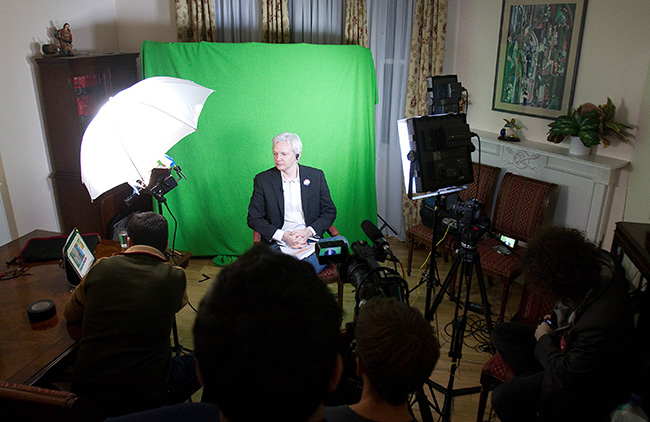Julian Assange explains why he’s standing for the Australian Senate
JULIAN Assange remins in the Ecuadorean Embassy, London. He’s been speaking with Russia Today:
RT: You are making a bid for the Australian Senate. Why?
Julian Assange: In order to promote our values within Australia. We face a very interesting situation, as an organization and me personally, with the Australian government, in response to pressure by the United States, starting to investigate our organization. It formed what it called a whole of government task force against WikiLeaks. Whole of government involved in the internal security service ASIO, the external security service ASIS, the department of defense, the Australian federal police equivalent of the FBI and the attorney general’s office. Publically announced that the Australian government would try and work out how to cancel my passport. It is an extremely rare procedure, last done to an Australian journalist in the ’60s-’70s – Wilfred Burchett. What was WikiLeaks’ connection to Australia? Was WikiLeaks publishing Australian secrets? No. Was WikiLeaks having its publishing service in Australia? No!
The connection to Australia is simply that I’m an Australian. And we also have one of our many non-profit registrations in Australia, and that’s all. And that alone and the US pressure was enough to cause the Australian government to roll over. That’s symptomatic of corruption in Canberra in general, which is a corruption not just in a regular financial sense, it’s a corruption of purpose. That when a government says that it’s going to represent the people, it’s not representing the people, it’s rather representing other interests.
RT: How easy is it to try and break into politics from inside the Ecuadorian embassy in London?
JA: It’s a fascinating situation that the Australian electoral code permits an imprisoned Australian overseas to run for the Australian Senate. That’s something quite interesting that when we first proposed that, the critics in the Australian establishment media said “Oh, that would be impossible.” But actually it is possible and the Australian Electoral Commission has recognized that. There’s been a variety of polls done in Australia that show that I have somewhere between 27 and 15 per cent support of the Australian population. Fourteen per cent is needed to be directly elected to the Senate without preferences. The WikiLeaks party itself is growing from strength to strength. We have potential candidates now in most Australian states.
RT: And on a practical level you can campaign remotely online?
JA: I don’t want to underestimate the difficulties of being in this situation. But WikiLeaks has certain abilities in using the internet, certain understanding on how to project the information on the internet. So we’ll see whether that works. I don’t know how much difficulty that’s going to be, how forgiving the Australian population will be of that difficulty. But I’m certain that the values that I have fought for 20 years, that the organization has fought for six or seven years, can be projected into the Australian debate of this election and that we will influence the policy positions of the other parties. They must shift ground if they are to be competitive with us for the Senate.
 RT: How long do you anticipate staying here?
RT: How long do you anticipate staying here?
JA: As long as it takes.
RT: Do you think your personal circumstances might change if Labour comes to power?
JA: The Labor Party is in power, and that’s one of the problems. The Labor Party is the most infiltrated and economically corrupt major party in the Australian politics. We see this from the US embassy cables. For example the current Foreign Minister Bob Carr was a US embassy informant even back in the 1970s, even when he was a senior member of the New South Wales Australian Union, a union leader constantly going into the American embassy. Why was a union leader constantly going to the US embassy, informing on the then Prime Minister Gough Whitlam, white-anting Gough Whitlam? Similarly, Mark Arbib now kicked out of the Cabinet partially as a result of being exposed as a US embassy informant. And the current Prime Minister Julia Gillard, who rolled the sitting Prime Minister Kevin Rudd. Why did that happen? And how did that happen? It happened in part because she sent her invoice to the US embassy and spoke to the security staff. There was a constant back and forth in this year-long sort of preparation where she was ingratiating herself with Rudd’s place.
RT: What about the British politics? If there’s a change of power here, do you think there could be some sort of deal struck between Ecuadorians and the Labour Party in the UK?
JA: A lot has been said about the British Foreign Minister William Hague that there does not exist a diplomatic situation that William Hague cannot make worse. We’ll see whether that statement is true. So far that has proven to be true, but really for the United Kingdom they’ve been handed a poisoned chalice.
I don’t want to underestimate the difficulties of being in this situation
Photo 1: I don’t want to underestimate the difficulties of being in this situation
Photo 2: Protestors outside the Oxford Union where Julian Assange is speaking via Video Link.
Posted: 13th, May 2013 | In: Reviews Comment | TrackBack | Permalink



